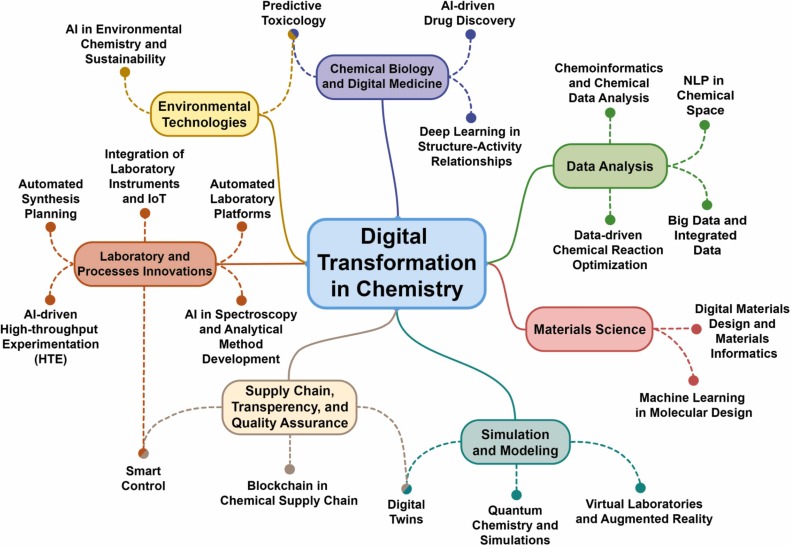
# The Impact of AI on Revolutionizing Chemistry: 20 Leading AI Technologies in Contemporary Chemistry
The integration of artificial intelligence (AI) is revolutionizing numerous scientific domains, placing chemistry at the forefront of this transformation. Recent accolades, such as the 2023 Nobel Prize in Physics recognizing advancements in artificial neural networks and AI’s significant contribution to accurately determining protein structures—which garnered the Nobel Prize in Chemistry—mark a significant milestone in the use of AI in scientific exploration. The chemical sector is particularly influenced, as AI reinterprets strategies for molecular design, chemical reactions, and ecological endeavors. Analysts even propose that AI’s role in chemistry could surpass the transformative impact of the internet.
A fresh examination led by **Valentine Ananikov**, a chemist affiliated with the Zelinsky Institute of Organic Chemistry, highlights the extensive array of AI-driven technologies shaping the chemistry of tomorrow. Below are the top 20 AI innovations set to redefine the domains of chemical study, industry, and creativity.
## 1. **Pharmaceutical Development**
AI is hastening the process of drug development by merging extensive chemical and biological datasets and pinpointing promising drug candidates. Groundbreaking tools like AlphaFold—lauded by the 2023 Nobel Prize—facilitate predictions regarding molecular interactions with biological targets, enhancing the discovery of potential pharmaceuticals. For instance, BenevolentAI discovered a compound for ALS in mere months—a process that typically spanned years.
## 2. **Data Analytics**
In the realm of chemistry, consolidating diverse experimental and simulation data remains a challenge. Big data and AI present solutions by amalgamating extensive datasets, delivering insights that accelerate exploration. Through the analysis of significant information volumes, AI promotes interdisciplinary collaboration and innovation in physical chemistry, materials science, and biochemistry.
## 3. **Automated Research Facilities**
The synthesis of chemical compounds and experimentation is increasingly governed by AI-enhanced, automated research platforms. These technologies improve data accuracy, reduce human errors, and manage intricate operations like high-throughput screening. Automated laboratories further promote reproducibility and safety by managing hazardous materials and adjusting chemical processes in real time.
## 4. **Connecting Lab Instruments with IoT**
Linking laboratory equipment to the Internet of Things (IoT) empowers researchers to facilitate automated data gathering and ongoing observation of chemical reactions and surroundings. This connectivity proves beneficial in diverse applications from drug formulation to environmental assessment, where immediate insights and modifications can result in revolutionary findings and enhanced operational safety.
## 5. **AI in Spectral Analysis and Method Development**
AI-powered spectroscopy significantly shortens the time required for data assessment. Trained on extensive spectral datasets, machine learning (ML) algorithms uncover connections between spectral characteristics and chemical attributes. This technology has implications across numerous disciplines, from enhancing contaminant monitoring in pharmaceuticals to identifying pollutants in environmental studies.
## 6. **Utilizing Blockchain for Supply Chain Improvement**
Implementing blockchain—technology that ensures secure and unalterable transaction records—allows the chemical sector to address challenges like counterfeit products and streamline inventory management. Distributed ledgers guarantee product authenticity, safety documentation, and adherence to regulations in industries such as pharmaceuticals and chemical production, facilitating dispute resolution and transparency in supply chains.
## 7. **Simulation Models**
Digital twins are virtual representations that mimic actual chemical systems or processes. They enable researchers to replicate chemical reactions, anticipate behaviors, and fine-tune experimental conditions without the limitations of physical experimentation. These models are particularly useful in enhancing operations within chemical plants, evaluating equipment reliability, and designing safety measures.
## 8. **Enhanced Learning with Augmented Reality and Virtual Labs**
Augmented reality and virtual laboratories offer immersive educational experiences, especially beneficial for students and trainees. They allow the virtual execution of experiments and the adjustment of variables within a controlled framework—providing more engaging educational experiences, lower costs, and reduced risks compared to traditional chemical laboratories.
## 9. **Natural Language Processing (NLP) in Chemistry**
As the volume of chemistry research literature skyrockets, NLP facilitates the extraction of insights from scientific writings, patents, and chemical repositories. NLP instruments transform unstructured information into useful data, enhancing researchers’ efficiency in drug discovery, chemical creation, and material exploration.
## 10. **Predictive Toxicology Models**
AI frameworks evaluate the toxicological profiles of chemicals during the initial stages of drug development. Machine learning methodologies allow for the precise forecasting of potentially harmful effects based on chemical structures, diminishing the dependency on lengthy and ethically complex animal testing. AI-driven predictive toxicology minimizes risks, improving safety in pharmaceuticals, cosmetics, and agricultural chemicals.
## 11. **AI Contributions to Green Chemistry**
The convergence of AI and sustainable chemistry presents opportunities for environmentally friendly chemical practices. AI can identify ecological pollutants in real-time, optimize assessments of air and water quality, and aid in the discovery of sustainable materials. The union of AI with remote sensing supports improved pollution monitoring and reduces chemical waste.
## 12. **Molecule Creation**
Machine